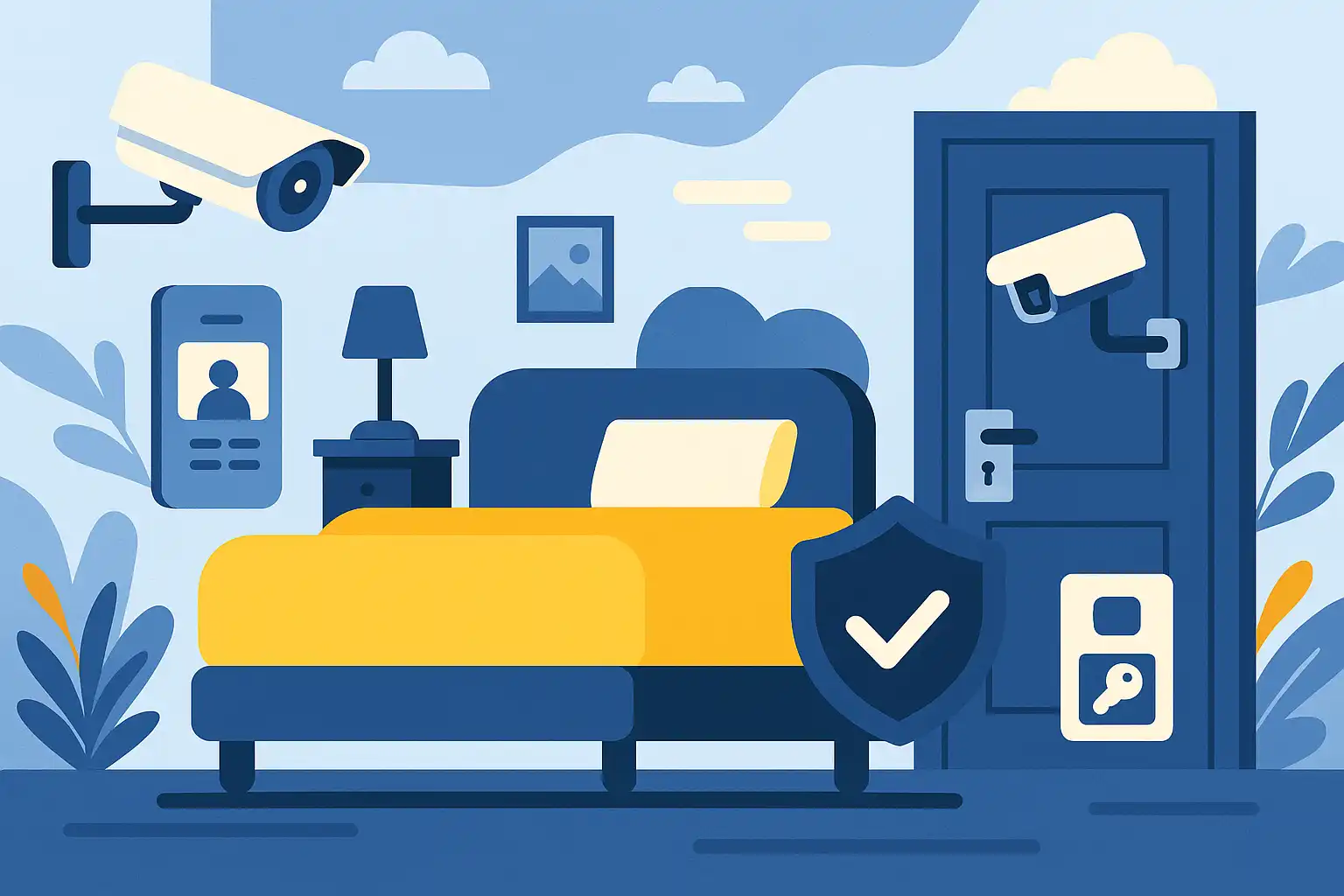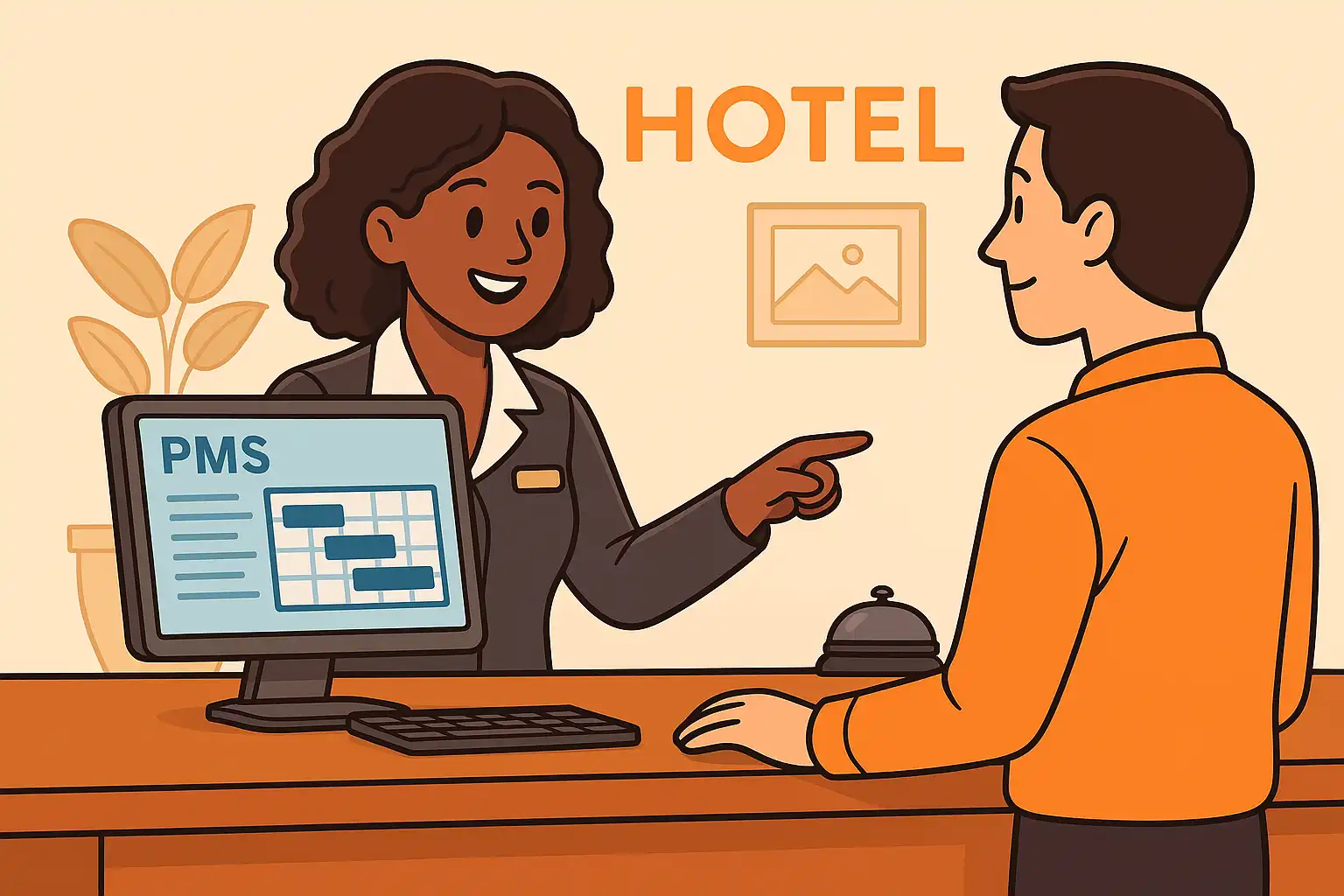Hotel Front Desk Receptionist: Learn All About the Job
Nov 24, 2025
 Mika Takahashi
Mika TakahashiPopular Categories
Hotel Technology & InnovationHotel Operations OptimizationDigital MarketingIndustry TrendsRevenue ManagementHospitality Industry
Popular Categories
Trending Post

Hotel Walk Letter Template: Professional Guest Communication

Online Travel Agents: What They Are and How They Work

Hotel Security Systems: Modern Protection Solutions

Hotel Advertising: Complete Guide to Boost Bookings and Revenue

25 Hotel Marketing Strategy Ideas for 2025: Complete Guide

AI Reservation Agent: Revolutionizing Hotel Booking and Guest Experience

PMS Communication: Streamlining Property Management Through Effective Guest Messaging
Table of contents
In hospitality, the hotel front desk receptionist is the first—and often most important—human connection your guests have with your property. You know that first impressions matter, and the front desk is where you set the tone for the entire guest experience. Whether you’re new to the industry or looking to sharpen your skills, understanding the full scope of hotel front desk operations will help you deliver service that guests remember for the right reasons.
Hotel front desk receptionists do a lot more than check guests in and out. They’re the hub of daily hotel activity, juggling everything from guest requests and room assignments to coordinating with housekeeping and managing reservations. This role demands a mix of solid customer service, tech know-how, and the ability to keep multiple balls in the air without dropping any.

What Is a Hotel Front Desk Receptionist?
Think of the hotel front desk receptionist as the face of your property. Unlike general office receptionists who focus mostly on administrative and clerical duties, hotel front desk staff are deeply involved in creating guest experiences that encourage loyalty and positive reviews.
The receptionist job description in hotels goes well beyond typical clerical receptionist duties. Receptionists act as the primary link between guests and all hotel services—from housekeeping to dining reservations. They provide excellent customer service while handling complex property management systems and managing multiple tasks at once.
In practice, a hotel front desk receptionist operates advanced front office software, manages digital communication channels, and coordinates with various departments to keep everything running smoothly. This blend of technical skills and people skills sets hotel receptionists apart from their counterparts in corporate or medical settings.
Here’s the kicker: hotel front desk receptionists also play a direct role in revenue management. Through upselling room upgrades or services, they help influence occupancy rates and overall profitability. Their job isn’t just to answer calls and greet visitors; it’s to create memorable first impressions that keep guests coming back.
Security is another key part of the role. Receptionists monitor guest access, verify IDs, and work with security teams to maintain a safe environment—something you won’t find in every receptionist job.
Core Responsibilities of Hotel Front Desk Receptionists
Hotel front desk receptionists wear many hats daily. Their tasks require a mix of tech skills, customer service, and operational know-how—all executed with attention to detail.
Guest Check-in and Check-out Operations
Checking guests in smoothly is one of the most critical tasks. Receptionists use property management systems to verify reservations, assign rooms based on guest preferences and availability, and program key cards. During busy check-in times, they balance speed with a personal touch to make each guest feel welcome.
Check-out is equally important. Receptionists review bills, process payments, and handle any last-minute questions or issues. They might also schedule future stays or collect feedback to help improve hotel operations.
Real-world example: At a busy resort, a front desk team noticed that guests often complained about long wait times during peak check-in hours. By adding a dedicated “express check-in” lane for returning guests with pre-registered profiles, they cut wait times by 30%, improving guest satisfaction scores.
Reservation Management and Revenue Optimization
Receptionists manage bookings, cancellations, and walk-in requests, always with an eye on maximizing revenue. They understand seasonal demand and competitor pricing, adjusting room assignments and upselling services accordingly.
When answering calls for new reservations, receptionists quickly assess guest needs and suggest room options that balance guest preferences with hotel profitability. Their communication and sales skills can directly boost revenue.
Interdepartmental Coordination
The front desk is the hotel’s communication hub. Receptionists coordinate with housekeeping to confirm room readiness, alert maintenance about repairs, and inform food service about special guest requests. Keeping all departments aligned ensures guests receive consistent service.
They also forward incoming calls to the appropriate teams and keep accurate records of guest requests and services delivered. Effective communication here directly impacts operational efficiency and guest satisfaction.
Administrative Support and Documentation
Receptionists handle various administrative duties like managing incoming and outgoing mail, ordering office supplies, and maintaining guest records in property management systems. These tasks require strong organizational skills to support smooth office operations.
They also prepare incident reports, guest feedback summaries, and shift reports that help management make informed decisions. Accuracy and confidentiality are critical in handling guest information.

Essential Skills for Hotel Front Desk Excellence
To succeed as a hotel front desk receptionist, you need a blend of technical skills, people skills, and operational knowledge. These skills develop through training and hands-on experience, and adapting to changing guest expectations is part of the job.
Customer Service and Hospitality Skills
At the heart of the role is excellent customer service. Receptionists must be warm, professional, and responsive to diverse guest needs. Greeting customers with genuine enthusiasm, listening carefully, and solving problems quickly are daily requirements.
Cultural sensitivity is key since guests come from all over the world. Adjusting your communication style to fit different backgrounds helps build rapport.
When guests have issues, receptionists are the first line of defense. Staying calm, showing empathy, and finding workable solutions can turn a complaint into a compliment.
Going the extra mile—like arranging special amenities for celebrations or coordinating last-minute transportation—can make all the difference.
Technical Proficiency
Modern hotels rely on sophisticated technology. Receptionists must master property management systems for guest registration, room inventory, billing, and reporting.
Communication tech goes beyond phones to include multi-line systems, voicemail, and messaging platforms. Managing these while serving guests in person requires solid multitasking and time management.
Handling payments means knowing cash, credit, mobile payments, and corporate billing. Accuracy and security here are non-negotiable.
Microsoft Office skills help with guest communications, occupancy tracking, and report preparation, boosting office efficiency.
Communication and Interpersonal Skills
Clear verbal communication is essential for explaining hotel amenities, directions, and services. Receptionists tailor their style depending on guest needs—sometimes detailed, sometimes brief.
Written communication supports emails, guest confirmations, and internal reports. Professional, error-free writing enhances the hotel’s image.
Active listening helps catch unspoken needs and anticipate guest requests before they arise.
Strong interpersonal skills foster good relationships with colleagues across departments, improving teamwork and service delivery.
Organizational and Administrative Skills
Time management helps receptionists juggle multiple tasks during busy periods without dropping the ball.
Organizational skills keep records accurate, files orderly, and daily duties on track.
Attention to detail prevents errors in billing, guest registration, and communications that could hurt guest satisfaction or hotel operations.
Multitasking lets receptionists handle guests, calls, and admin duties simultaneously—an essential skill in a fast-paced environment.
Career Progression in Hotel Front Office Operations
The hotel industry offers clear paths for front desk receptionists who want to grow. Experience, skill development, and ongoing learning open doors to higher roles.
Entry-Level Positions
Front Desk Agent roles focus on basic guest services like check-in/out, reservations, and answering questions. These roles build foundational hotel operations experience.
Night Auditor positions handle overnight financial tasks and security, posting charges and reconciling accounts. This role sharpens math and problem-solving skills, often leading to supervisory jobs.
Guest Services Representative roles provide concierge-style services, from restaurant bookings to activity planning, enhancing guest satisfaction.
Reservations Agent positions specialize in booking management and revenue optimization, developing sales and forecasting expertise.
Supervisory Roles
Front Desk Supervisor oversees daily front office operations, staff scheduling, and training. They handle escalated guest issues and ensure smooth shift transitions.
Guest Services Manager focuses on improving guest satisfaction through staff training and process improvements.
Front Office Manager directs all front desk operations, including budgeting, staffing, and strategic planning.
Management Positions
Director of Front Office Operations oversees guest-facing departments and shapes service strategies.
General Manager leads the entire property, managing all departments, finances, and community relations.

Hotel Work Environment and Schedule
Working at the hotel front desk is a unique experience compared to traditional office settings. Knowing what to expect helps you prepare.
Physical Work Environment
Front desk areas are open and busy, with multiple computer monitors, multi-line phones, and specialized payment equipment. Expect to stand for long periods, especially during busy check-in/out times.
Noise levels vary with occupancy and events, so staying focused amid distractions is part of the job.
Scheduling and Shift Patterns
Hotels operate 24/7, so shifts rotate—morning, evening, and overnight. Peak seasons, holidays, and events may require overtime and weekend work.
Flexible schedules appeal to students and those with second jobs, offering mid-week days off or compressed workweeks.
Professional Standards and Dress Code
Hotels enforce professional dress codes and grooming standards to maintain brand image. Communication protocols and guest interaction guidelines ensure consistent service quality.
Training focuses on communication, cultural sensitivity, and handling guest issues.
Education and Training Requirements
Most front desk receptionist jobs require a high school diploma or equivalent. Hospitality or business education can give you an edge.
Language skills, especially bilingualism, are highly valued in international markets.
Training covers hotel policies, property management systems, emergency procedures, and customer service standards.
Certifications from organizations like the American Hotel & Lodging Educational Institute boost your credibility and career prospects.
Cross-training in housekeeping or food service broadens your understanding and improves coordination.
Salary and Benefits in Hotel Industry
Salaries vary by property type, location, and experience. Median wages hover around $29,000 annually but can range from $25,000 at budget hotels to $55,000 or more at luxury properties.
Urban and resort locations typically offer higher pay due to cost of living and demand.
Benefits often include travel discounts, health insurance, paid time off, and performance bonuses.
Supervisory and management roles command higher salaries, sometimes doubling entry-level pay.
Future Trends in Hotel Front Desk Operations
Technology is reshaping hotel front desks. Mobile check-in, contactless keys, and AI chatbots handle routine tasks, letting receptionists focus on personalized guest service.
Customer relationship management tools help tailor experiences based on guest history.
Sustainability initiatives add new responsibilities, like promoting eco-friendly practices.
Labor shortages mean more opportunities for advancement and better pay for skilled receptionists.
Pro Tip: Use Technology to Your Advantage
Master your property management system and communication tools. Efficient tech use frees you to focus on guests, handle multiple tasks smoothly, and reduce errors.
Myth vs Reality: “Technology Will Replace Front Desk Receptionists”
While automation handles routine tasks, guests still value human interaction—especially for complex requests and personalized service. The receptionist role is evolving, not disappearing.
Conclusion
Hotel front desk receptionists are essential to guest satisfaction and hotel success. Their role extends beyond traditional receptionist duties to include revenue management, guest relations, and interdepartmental coordination.
With clear career paths and evolving technology, front desk reception offers rewarding opportunities for those who combine people skills with operational savvy.
Whether you’re starting out or aiming to move up, mastering the art and science of front desk work will set you—and your hotel—up for success.
Key Takeaways
- The hotel front desk receptionist is the face of your property and central to guest experience.
- Responsibilities include guest check-in/out, reservation management, interdepartmental coordination, and administrative tasks.
- Success requires a mix of customer service, technical proficiency, communication, and organizational skills.
- Career progression ranges from entry-level front desk agent to general manager.
- Hotel front desk work involves unique physical and scheduling demands.
- Technology enhances but doesn’t replace the human element in front desk roles.
- Ongoing training and certifications boost career growth and effectiveness.
